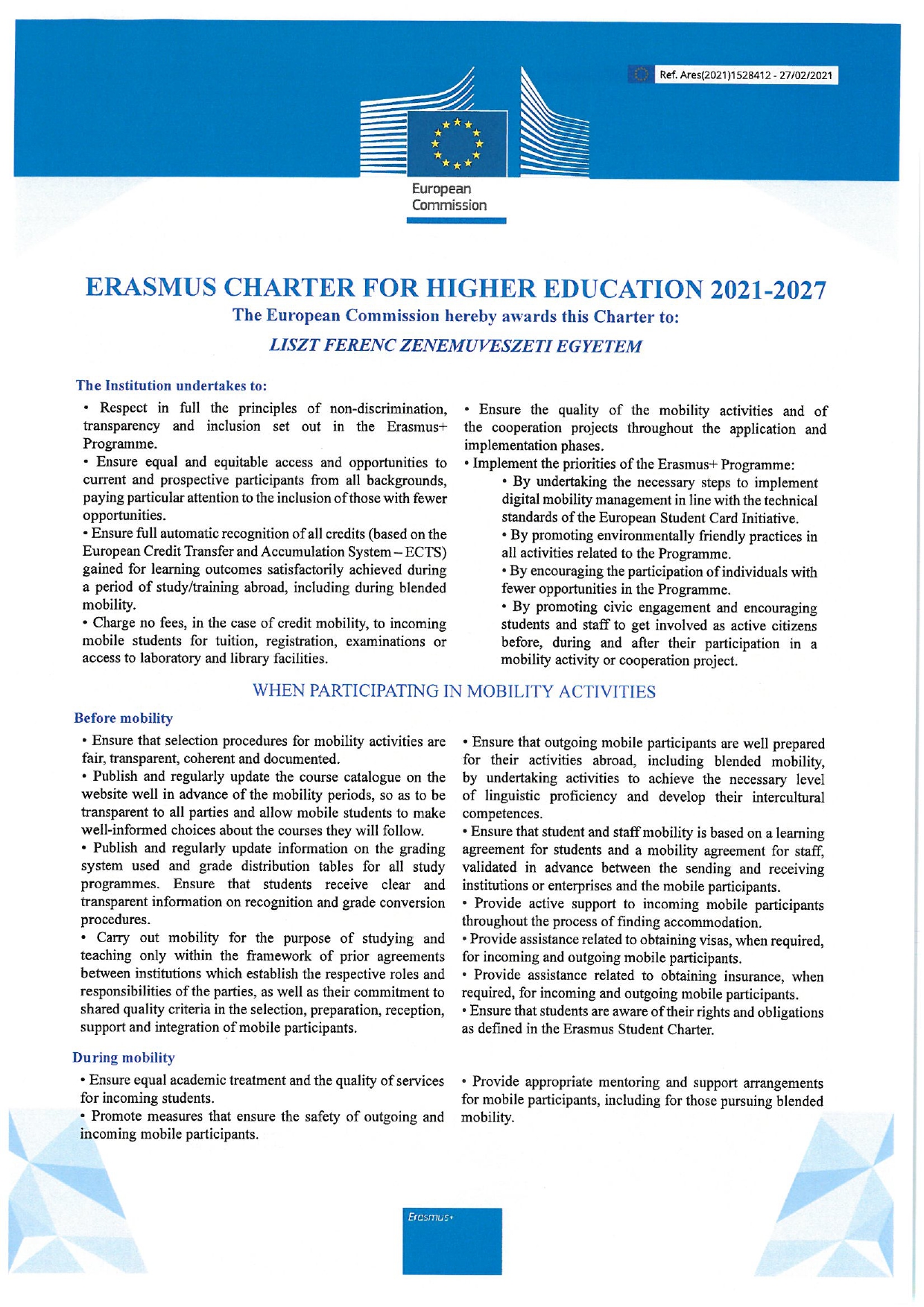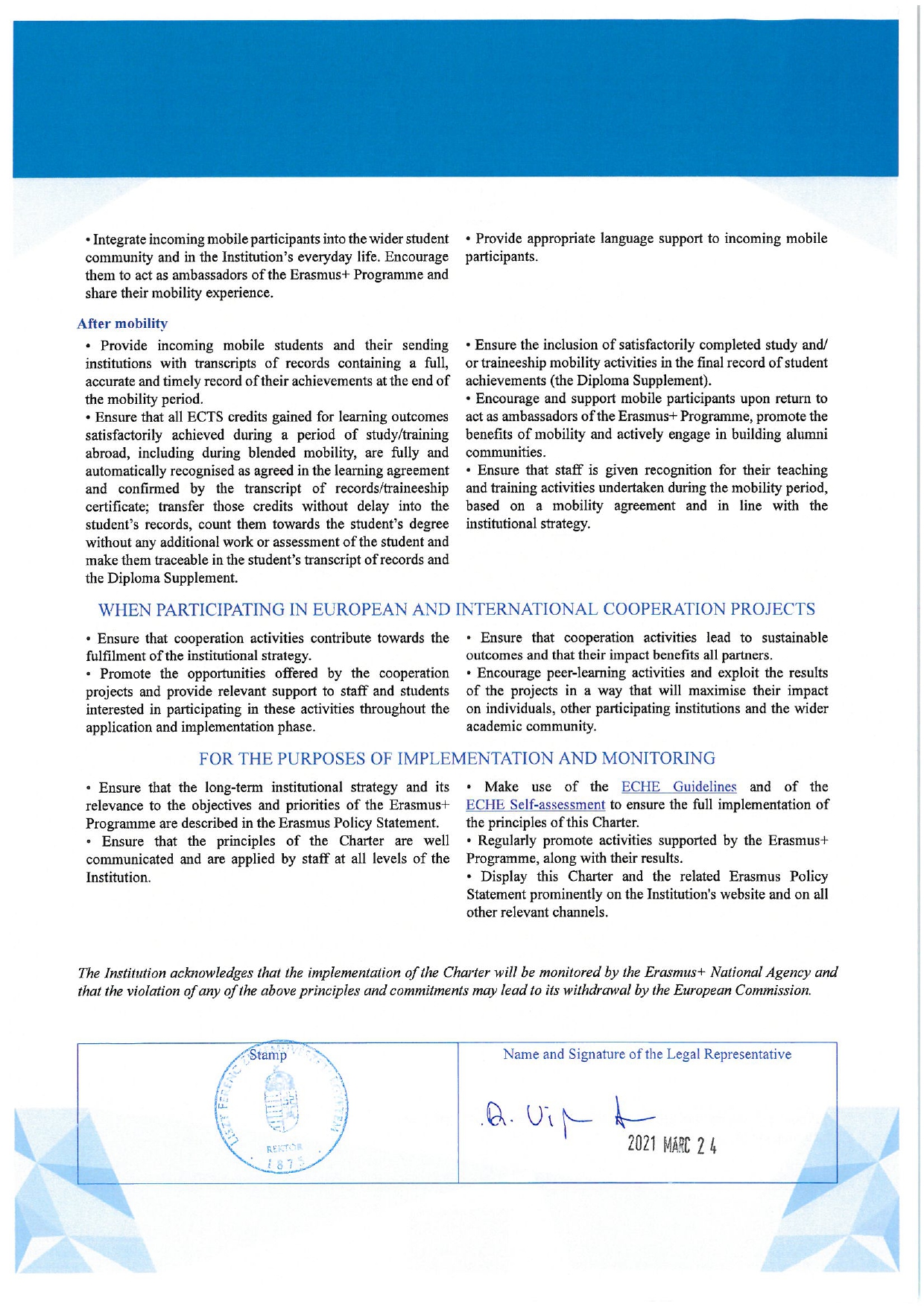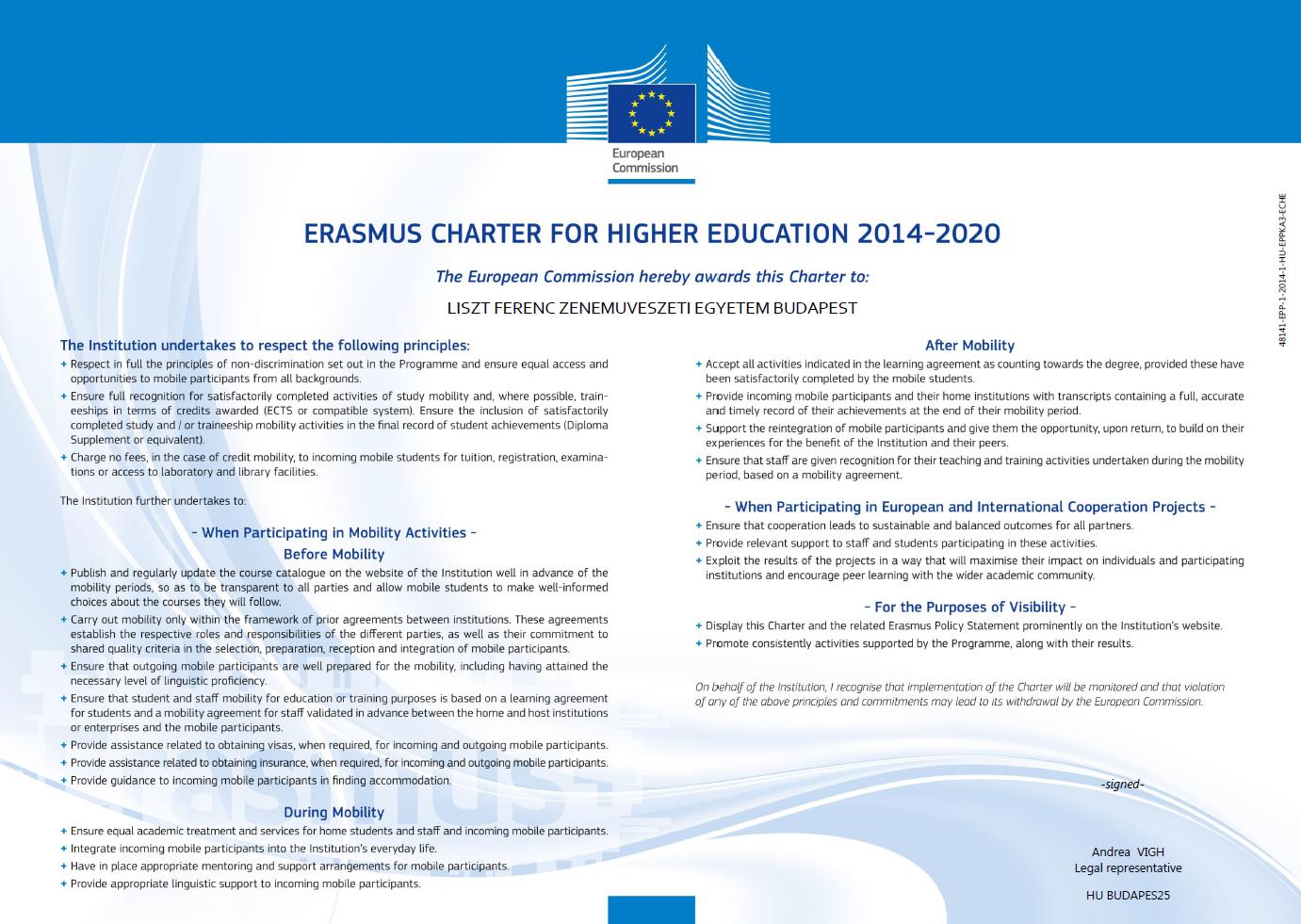Erasmus Charter for Higher Education (ECHE)
2021-2027


2014-2020
Click on the photo for higher resolution!
Erasmus University Charter 2002-2006
In the 2002-2006 application period our institution was mostly engaged in student and teacher mobility programmes. Due to our bilateral agreements at higher education level the number of outgoing and incoming students has been risen dynamically, within five years the numbers became five times more.
In the future we wish to increase the number of the students and staff going abroad. The number of our bilateral cooperation agreements has risen from 23 to 44 since the last application period. We wish to increase this number again primarily with the countries that joined the EU recently (Romania, Bulgaria).
According to our experiences the European institutions of higher education welcome our students and teachers kindly.
We would like to start a Bilateral Intensive Programme with our foreign partners, in which teachers and students can travel together to each others country in order to carry out their projects.
We are members of the AEC – Association Européenne des Conservatoires, Académies de Musique et Musikhochschulen – we take part in the AEC Annual Meetings regularly. In the organisation of the AEC we work together with six other European universities in the Polifonia project in the frame of the Erasmus Thematic Network in the "pre-college working group". This group deals with the examination of the conditions of the admission to higher education.
We took part in various IP programmes together with other European universities in the organisation of the AEC, like the Internationale Sommerakademie, the Prague-Vienna-Budapest, the International Sweelink Festival in Amsterdam and the Europäisches Klavierforum in Berlin.
In the organisation of the AEC we held a Bologna seminar in 2004 with the participation of hte colleges from the country, where we worked together with the directors of British and Dutch partner institutions on facilitating the introduction of a multi-cycle education system.
In 2007 our educational system will change to a two and three cycle system. We start a BA, MA and PG programm that is in harmony with European higher education systems. With the help of this process we will provide easier transition for students among the various countries. Our curriculums became much more detailed, the use of the credit system will be general in every cycle. It will be easier to specialize after the 3-year BA training and to engage in optional special courses.
The regular doctoral training (3. cycle) started ten years ago at our university. Of all the Hungarian institutions we are the only one where the highest – the doctoral – degree can be obtained. In the last five years we gave doctoral degree to 28 DLA students. Like in other European universities the doctoral training is running in the credit system. After the EU-accession of Hungary, citizens from the EU could apply for the doctoral training at our university as well.
The integration of the Kodály Institute gave the opportunity to work out a postgraduate studies programme that can be attended by Hungarians beyond the frontier as well as by teachers from the EU. Within the LLL Programme we will start an MA training in Kodály Music Pedagogy in Hungarian and English language from the year 2007.
It is a unique condition in Europe that the Bartók Béla Conservatoire is part of our university as a teacher training institution. This is why we will be able to make good use of the application possibilities that come from the merger of Erasmus-Leonardo programmes in the future.
b. Please also provide information on the following points:
What specific actions are planned to give visibility to Erasmus activities and what type of publicity will be given to the Erasmus University Charter and the EPS?
What kind of arrangements, if any, does the Institution ensure to comply with non-discrimination objectives (e.g. actions related to gender equality, integration of disabled students and staff, enhancement of social and economic cohesion and combating of xenophobia and racism)?
We publish our Erasmus activities on our website, we provide detailed information on the conditions of participation in the programmes. The application possibilities are accessible to everyone. We prepare a printed booklet containing the rewritten curriculum of the two-cycle system (BA, MA), the descriptions of the courses and final examination requirements. Our university's EPS will be published on our website.
As part of the combating against xenophobia and racism we applied for financial assistance at the "Open Society Institute" (Soros Alapítvány) for supporting the Roma minority. With the money obtained from the Institute (10 Million forints) we wish to help disadvantaged Roma students studying at our university, who represented in a much greater percentage at our university than in other layers of society.
Disabled and disadvantaged students and teachers can apply with equal chance for admission to our institution, the only condition of admission is talent.
c. Quality of academic mobility activities:
What kind of sprecific measures are implemented in the institution to ensure high quality in academic mobility activities?
Details should be provided on: recognition and credit sytems, the provision of information on curricula, information and counselling of outgoing students, tutoring and integration of incoming students, provision of student services (in particular accomodation), preparatory and refresher language courses, support and acknowledgement of staff mobility.
Our students can only study in those institutions in the Erasmus exchange programmes, whose study systems agree with ours in at least 75%. For the recognition of the credits for students that have been studying abroad we established a Credit Transfer Committee that is designed for converting credits that have been obtained in partner institutions and for entering these in the markbook of the student.
Our outgoing students stay in contact with our university during the period they are abroad and after they return they write a report on their experiences.
Those students who plan to study abroad for a term can gather information at the International Department or from the booklets and publications that are accessible in the library, which contain the latest invitations and the courses offered at the partner institutions. For this purpose we establish an Erasmus stand in the library where every student can find the publications of the partner institutions.
Incoming students are supplied with special offers on housing by the International Department. This department provides accomodations where regular instrumental practice is possible. Members of the HÖK (Students' Committee) tutor visiting students for a month, they help their adjustment to our university.
From the year 2006 on we issue a "Diploma Supplement" for every graduate that provides a comprehensive review of the completed studies.
The exchange of our teachers and students is made easier by the fact that the language of music is multinational. In spite of this it is essential to obtain some knowledge of the language to help adjustment.Three years ago we started a Hungarian language course (1,5 hours twice a week) for our foreign Erasmus students that they can attend on a beginner and an advanced level.
We recognise the Erasmus teaching activities of oue teachers abroad – and we take them into account for the progress of the teachers.
From 2007 on we plan to organize the mobility of the administrative staff for instruction and educational purposes.
d. Quality of student placement activities:
What kind of specific measures are implemented to ensure high quality in student placements? Give details on how the work-programme and the placement agreements are prepared and implemented. Please describe the practical arrangements agreed between the parties. Please specify also the monitoring and evaluation of the placement(s) period as well as its recognition in the curriculum.
At our university professionel practice is are realised through the performing arts. In the last two years we organized our orchestra under the conduct of world-famous artists (András Schiff, Zoltán Kocsis), whose aim was the accomplishment of specific musical projects. Members of the orchestra are regular and foreign Erasmus students whose work is rewarded with credit points that are included in their studies.
On the basis of the agreement with the Palace of Arts (Művészetek Palotája) our students perform 20 times per month in various halls of the building. The evaluation of the students' performance – and the recognition of their work in their markbooks – is done in the form of credit points.



